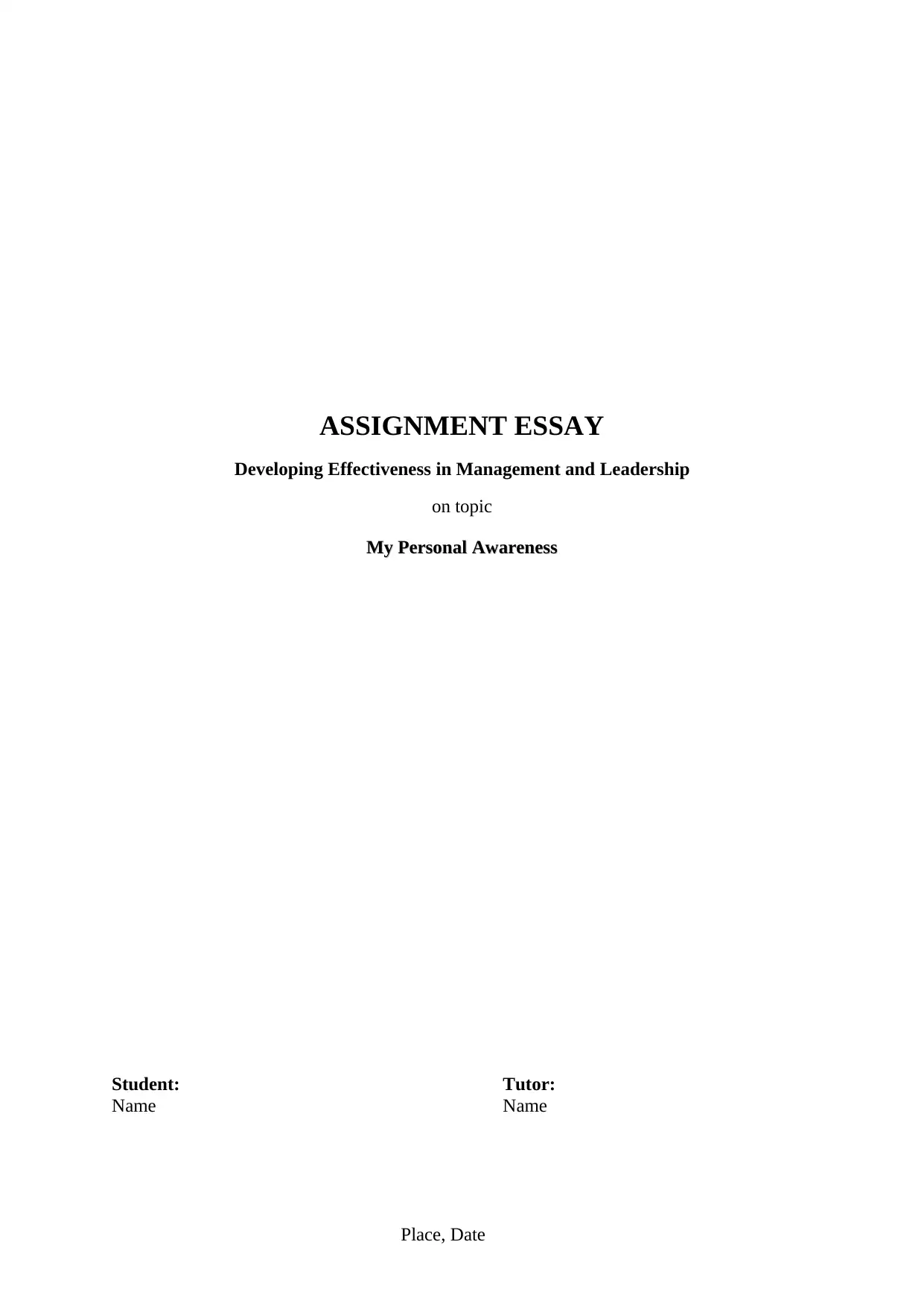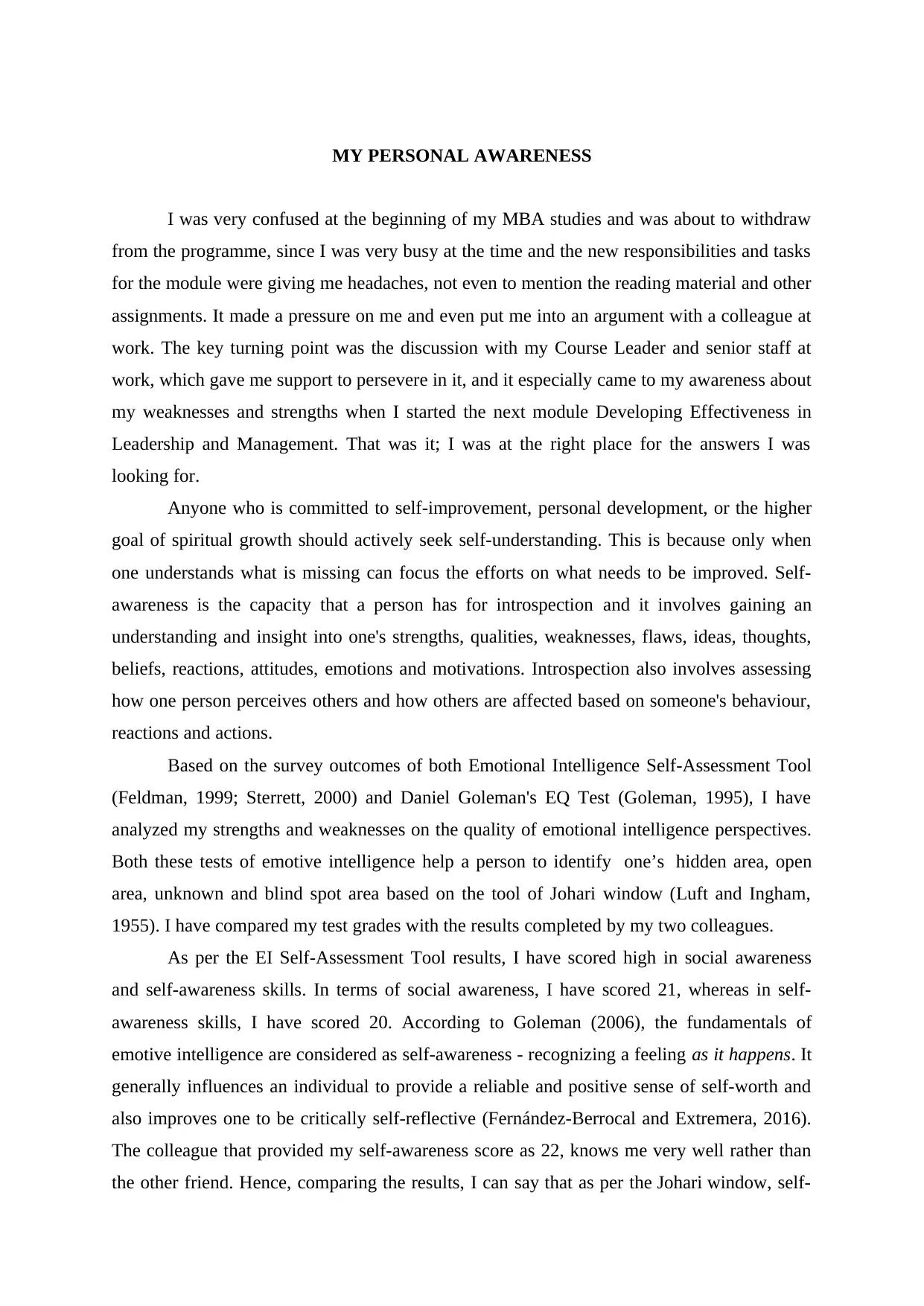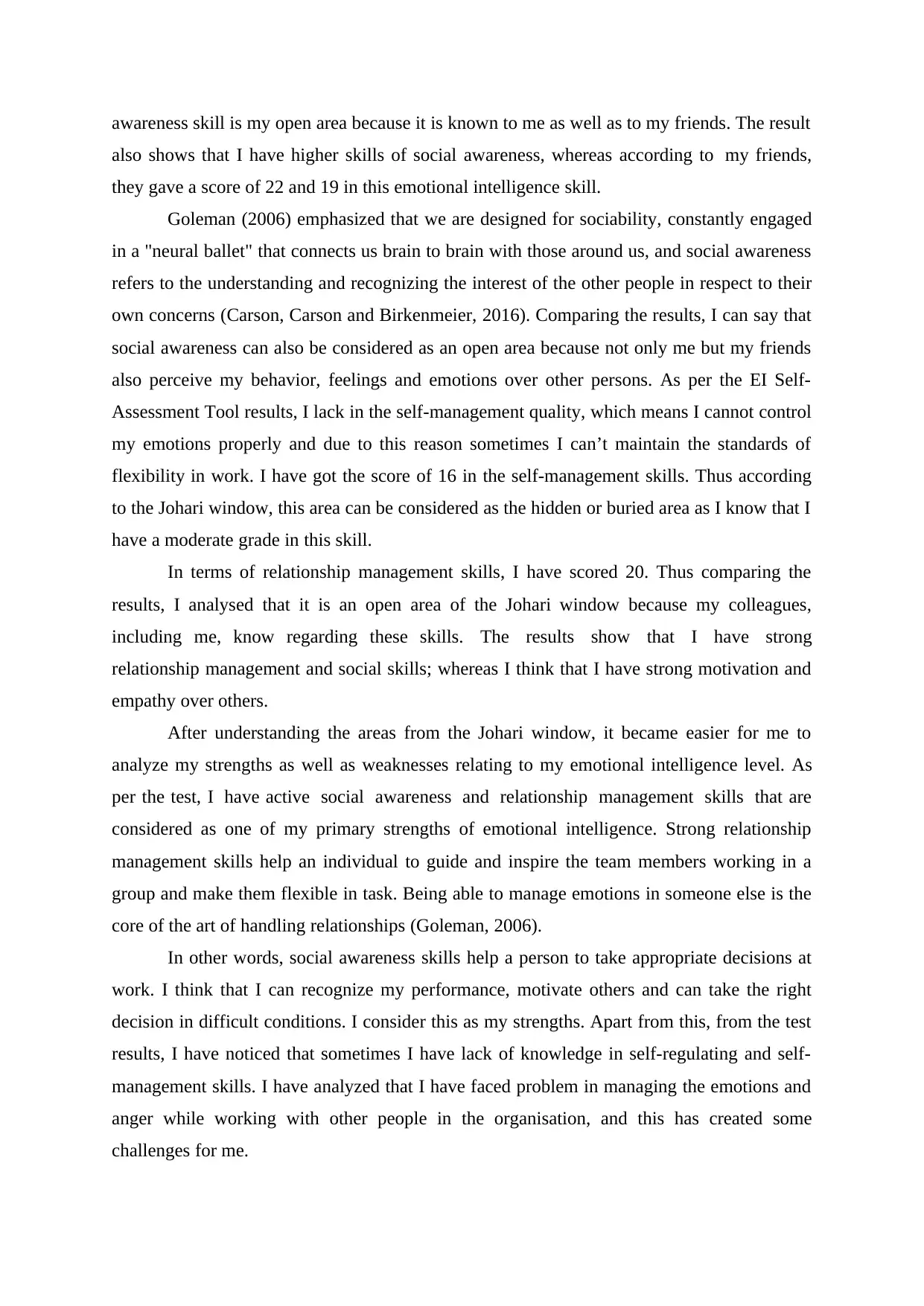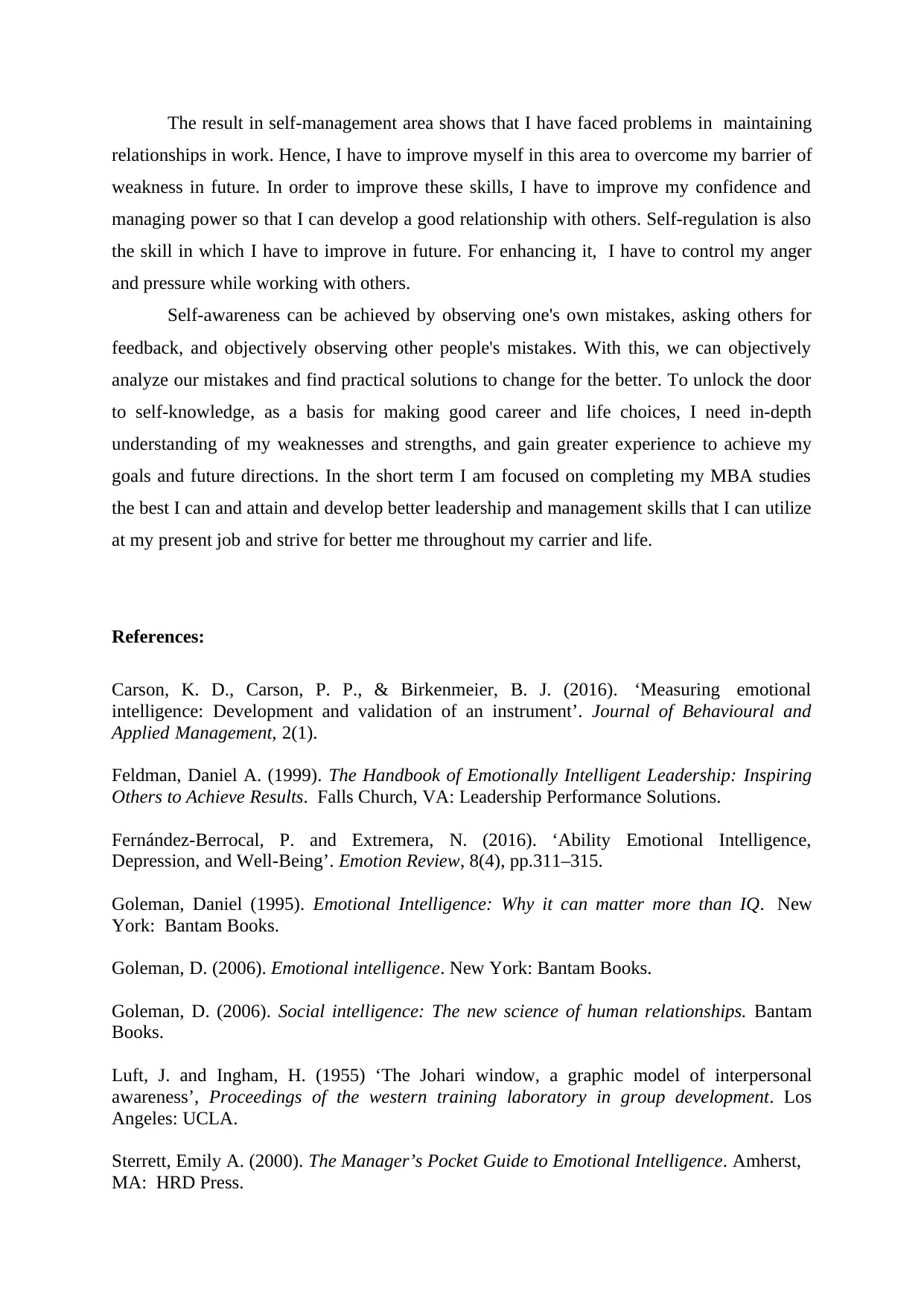Developing Effectiveness in Management and Leadership: An Essay
VerifiedAdded on 2023/07/05
|4
|1477
|316
Essay
AI Summary
This essay delves into the author's journey of self-discovery during their MBA studies, highlighting the importance of personal awareness in developing effective leadership and management skills. Initially overwhelmed by the program, the author found a turning point in the 'Developing Effectiveness in Leadership and Management' module, which prompted introspection on their strengths and weaknesses. The essay analyzes the results of Emotional Intelligence Self-Assessment Tool and Daniel Goleman's EQ Test, utilizing the Johari window to identify open, hidden, unknown, and blind spot areas. The author identifies social awareness and relationship management as strengths, while self-management requires improvement. The essay concludes with a plan for enhancing self-regulation and confidence to foster better relationships and achieve personal and professional goals, emphasizing the continuous pursuit of self-knowledge for career and life choices.

ASSIGNMENT ESSAY
Developing Effectiveness in Management and Leadership
on topic
MyMy PersonalPersonal AwarenessAwareness
Student: Tutor:
Name Name
Place, Date
Developing Effectiveness in Management and Leadership
on topic
MyMy PersonalPersonal AwarenessAwareness
Student: Tutor:
Name Name
Place, Date
Paraphrase This Document
Need a fresh take? Get an instant paraphrase of this document with our AI Paraphraser

MY PERSONAL AWARENESS
I was very confused at the beginning of my MBA studies and was about to withdraw
from the programme, since I was very busy at the time and the new responsibilities and tasks
for the module were giving me headaches, not even to mention the reading material and other
assignments. It made a pressure on me and even put me into an argument with a colleague at
work. The key turning point was the discussion with my Course Leader and senior staff at
work, which gave me support to persevere in it, and it especially came to my awareness about
my weaknesses and strengths when I started the next module Developing Effectiveness in
Leadership and Management. That was it; I was at the right place for the answers I was
looking for.
Anyone who is committed to self-improvement, personal development, or the higher
goal of spiritual growth should actively seek self-understanding. This is because only when
one understands what is missing can focus the efforts on what needs to be improved. Self-
awareness is the capacity that a person has for introspection and it involves gaining an
understanding and insight into one's strengths, qualities, weaknesses, flaws, ideas, thoughts,
beliefs, reactions, attitudes, emotions and motivations. Introspection also involves assessing
how one person perceives others and how others are affected based on someone's behaviour,
reactions and actions.
Based on the survey outcomes of both Emotional Intelligence Self-Assessment Tool
(Feldman, 1999; Sterrett, 2000) and Daniel Goleman's EQ Test (Goleman, 1995), I have
analyzed my strengths and weaknesses on the quality of emotional intelligence perspectives.
Both these tests of emotive intelligence help a person to identify one’s hidden area, open
area, unknown and blind spot area based on the tool of Johari window (Luft and Ingham,
1955). I have compared my test grades with the results completed by my two colleagues.
As per the EI Self-Assessment Tool results, I have scored high in social awareness
and self-awareness skills. In terms of social awareness, I have scored 21, whereas in self-
awareness skills, I have scored 20. According to Goleman (2006), the fundamentals of
emotive intelligence are considered as self-awareness - recognizing a feeling as it happens. It
generally influences an individual to provide a reliable and positive sense of self-worth and
also improves one to be critically self-reflective (Fernández-Berrocal and Extremera, 2016).
The colleague that provided my self-awareness score as 22, knows me very well rather than
the other friend. Hence, comparing the results, I can say that as per the Johari window, self-
I was very confused at the beginning of my MBA studies and was about to withdraw
from the programme, since I was very busy at the time and the new responsibilities and tasks
for the module were giving me headaches, not even to mention the reading material and other
assignments. It made a pressure on me and even put me into an argument with a colleague at
work. The key turning point was the discussion with my Course Leader and senior staff at
work, which gave me support to persevere in it, and it especially came to my awareness about
my weaknesses and strengths when I started the next module Developing Effectiveness in
Leadership and Management. That was it; I was at the right place for the answers I was
looking for.
Anyone who is committed to self-improvement, personal development, or the higher
goal of spiritual growth should actively seek self-understanding. This is because only when
one understands what is missing can focus the efforts on what needs to be improved. Self-
awareness is the capacity that a person has for introspection and it involves gaining an
understanding and insight into one's strengths, qualities, weaknesses, flaws, ideas, thoughts,
beliefs, reactions, attitudes, emotions and motivations. Introspection also involves assessing
how one person perceives others and how others are affected based on someone's behaviour,
reactions and actions.
Based on the survey outcomes of both Emotional Intelligence Self-Assessment Tool
(Feldman, 1999; Sterrett, 2000) and Daniel Goleman's EQ Test (Goleman, 1995), I have
analyzed my strengths and weaknesses on the quality of emotional intelligence perspectives.
Both these tests of emotive intelligence help a person to identify one’s hidden area, open
area, unknown and blind spot area based on the tool of Johari window (Luft and Ingham,
1955). I have compared my test grades with the results completed by my two colleagues.
As per the EI Self-Assessment Tool results, I have scored high in social awareness
and self-awareness skills. In terms of social awareness, I have scored 21, whereas in self-
awareness skills, I have scored 20. According to Goleman (2006), the fundamentals of
emotive intelligence are considered as self-awareness - recognizing a feeling as it happens. It
generally influences an individual to provide a reliable and positive sense of self-worth and
also improves one to be critically self-reflective (Fernández-Berrocal and Extremera, 2016).
The colleague that provided my self-awareness score as 22, knows me very well rather than
the other friend. Hence, comparing the results, I can say that as per the Johari window, self-

awareness skill is my open area because it is known to me as well as to my friends. The result
also shows that I have higher skills of social awareness, whereas according to my friends,
they gave a score of 22 and 19 in this emotional intelligence skill.
Goleman (2006) emphasized that we are designed for sociability, constantly engaged
in a "neural ballet" that connects us brain to brain with those around us, and social awareness
refers to the understanding and recognizing the interest of the other people in respect to their
own concerns (Carson, Carson and Birkenmeier, 2016). Comparing the results, I can say that
social awareness can also be considered as an open area because not only me but my friends
also perceive my behavior, feelings and emotions over other persons. As per the EI Self-
Assessment Tool results, I lack in the self-management quality, which means I cannot control
my emotions properly and due to this reason sometimes I can’t maintain the standards of
flexibility in work. I have got the score of 16 in the self-management skills. Thus according
to the Johari window, this area can be considered as the hidden or buried area as I know that I
have a moderate grade in this skill.
In terms of relationship management skills, I have scored 20. Thus comparing the
results, I analysed that it is an open area of the Johari window because my colleagues,
including me, know regarding these skills. The results show that I have strong
relationship management and social skills; whereas I think that I have strong motivation and
empathy over others.
After understanding the areas from the Johari window, it became easier for me to
analyze my strengths as well as weaknesses relating to my emotional intelligence level. As
per the test, I have active social awareness and relationship management skills that are
considered as one of my primary strengths of emotional intelligence. Strong relationship
management skills help an individual to guide and inspire the team members working in a
group and make them flexible in task. Being able to manage emotions in someone else is the
core of the art of handling relationships (Goleman, 2006).
In other words, social awareness skills help a person to take appropriate decisions at
work. I think that I can recognize my performance, motivate others and can take the right
decision in difficult conditions. I consider this as my strengths. Apart from this, from the test
results, I have noticed that sometimes I have lack of knowledge in self-regulating and self-
management skills. I have analyzed that I have faced problem in managing the emotions and
anger while working with other people in the organisation, and this has created some
challenges for me.
also shows that I have higher skills of social awareness, whereas according to my friends,
they gave a score of 22 and 19 in this emotional intelligence skill.
Goleman (2006) emphasized that we are designed for sociability, constantly engaged
in a "neural ballet" that connects us brain to brain with those around us, and social awareness
refers to the understanding and recognizing the interest of the other people in respect to their
own concerns (Carson, Carson and Birkenmeier, 2016). Comparing the results, I can say that
social awareness can also be considered as an open area because not only me but my friends
also perceive my behavior, feelings and emotions over other persons. As per the EI Self-
Assessment Tool results, I lack in the self-management quality, which means I cannot control
my emotions properly and due to this reason sometimes I can’t maintain the standards of
flexibility in work. I have got the score of 16 in the self-management skills. Thus according
to the Johari window, this area can be considered as the hidden or buried area as I know that I
have a moderate grade in this skill.
In terms of relationship management skills, I have scored 20. Thus comparing the
results, I analysed that it is an open area of the Johari window because my colleagues,
including me, know regarding these skills. The results show that I have strong
relationship management and social skills; whereas I think that I have strong motivation and
empathy over others.
After understanding the areas from the Johari window, it became easier for me to
analyze my strengths as well as weaknesses relating to my emotional intelligence level. As
per the test, I have active social awareness and relationship management skills that are
considered as one of my primary strengths of emotional intelligence. Strong relationship
management skills help an individual to guide and inspire the team members working in a
group and make them flexible in task. Being able to manage emotions in someone else is the
core of the art of handling relationships (Goleman, 2006).
In other words, social awareness skills help a person to take appropriate decisions at
work. I think that I can recognize my performance, motivate others and can take the right
decision in difficult conditions. I consider this as my strengths. Apart from this, from the test
results, I have noticed that sometimes I have lack of knowledge in self-regulating and self-
management skills. I have analyzed that I have faced problem in managing the emotions and
anger while working with other people in the organisation, and this has created some
challenges for me.
⊘ This is a preview!⊘
Do you want full access?
Subscribe today to unlock all pages.

Trusted by 1+ million students worldwide

The result in self-management area shows that I have faced problems in maintaining
relationships in work. Hence, I have to improve myself in this area to overcome my barrier of
weakness in future. In order to improve these skills, I have to improve my confidence and
managing power so that I can develop a good relationship with others. Self-regulation is also
the skill in which I have to improve in future. For enhancing it, I have to control my anger
and pressure while working with others.
Self-awareness can be achieved by observing one's own mistakes, asking others for
feedback, and objectively observing other people's mistakes. With this, we can objectively
analyze our mistakes and find practical solutions to change for the better. To unlock the door
to self-knowledge, as a basis for making good career and life choices, I need in-depth
understanding of my weaknesses and strengths, and gain greater experience to achieve my
goals and future directions. In the short term I am focused on completing my MBA studies
the best I can and attain and develop better leadership and management skills that I can utilize
at my present job and strive for better me throughout my carrier and life.
References:
Carson, K. D., Carson, P. P., & Birkenmeier, B. J. (2016). ‘Measuring emotional
intelligence: Development and validation of an instrument’. Journal of Behavioural and
Applied Management, 2(1).
Feldman, Daniel A. (1999). The Handbook of Emotionally Intelligent Leadership: Inspiring
Others to Achieve Results. Falls Church, VA: Leadership Performance Solutions.
Fernández-Berrocal, P. and Extremera, N. (2016). ‘Ability Emotional Intelligence,
Depression, and Well-Being’. Emotion Review, 8(4), pp.311–315.
Goleman, Daniel (1995). Emotional Intelligence: Why it can matter more than IQ. New
York: Bantam Books.
Goleman, D. (2006). Emotional intelligence. New York: Bantam Books.
Goleman, D. (2006). Social intelligence: The new science of human relationships. Bantam
Books.
Luft, J. and Ingham, H. (1955) ‘The Johari window, a graphic model of interpersonal
awareness’, Proceedings of the western training laboratory in group development. Los
Angeles: UCLA.
Sterrett, Emily A. (2000). The Manager’s Pocket Guide to Emotional Intelligence. Amherst,
MA: HRD Press.
relationships in work. Hence, I have to improve myself in this area to overcome my barrier of
weakness in future. In order to improve these skills, I have to improve my confidence and
managing power so that I can develop a good relationship with others. Self-regulation is also
the skill in which I have to improve in future. For enhancing it, I have to control my anger
and pressure while working with others.
Self-awareness can be achieved by observing one's own mistakes, asking others for
feedback, and objectively observing other people's mistakes. With this, we can objectively
analyze our mistakes and find practical solutions to change for the better. To unlock the door
to self-knowledge, as a basis for making good career and life choices, I need in-depth
understanding of my weaknesses and strengths, and gain greater experience to achieve my
goals and future directions. In the short term I am focused on completing my MBA studies
the best I can and attain and develop better leadership and management skills that I can utilize
at my present job and strive for better me throughout my carrier and life.
References:
Carson, K. D., Carson, P. P., & Birkenmeier, B. J. (2016). ‘Measuring emotional
intelligence: Development and validation of an instrument’. Journal of Behavioural and
Applied Management, 2(1).
Feldman, Daniel A. (1999). The Handbook of Emotionally Intelligent Leadership: Inspiring
Others to Achieve Results. Falls Church, VA: Leadership Performance Solutions.
Fernández-Berrocal, P. and Extremera, N. (2016). ‘Ability Emotional Intelligence,
Depression, and Well-Being’. Emotion Review, 8(4), pp.311–315.
Goleman, Daniel (1995). Emotional Intelligence: Why it can matter more than IQ. New
York: Bantam Books.
Goleman, D. (2006). Emotional intelligence. New York: Bantam Books.
Goleman, D. (2006). Social intelligence: The new science of human relationships. Bantam
Books.
Luft, J. and Ingham, H. (1955) ‘The Johari window, a graphic model of interpersonal
awareness’, Proceedings of the western training laboratory in group development. Los
Angeles: UCLA.
Sterrett, Emily A. (2000). The Manager’s Pocket Guide to Emotional Intelligence. Amherst,
MA: HRD Press.
1 out of 4
Related Documents
Your All-in-One AI-Powered Toolkit for Academic Success.
+13062052269
info@desklib.com
Available 24*7 on WhatsApp / Email
![[object Object]](/_next/static/media/star-bottom.7253800d.svg)
Unlock your academic potential
Copyright © 2020–2026 A2Z Services. All Rights Reserved. Developed and managed by ZUCOL.




